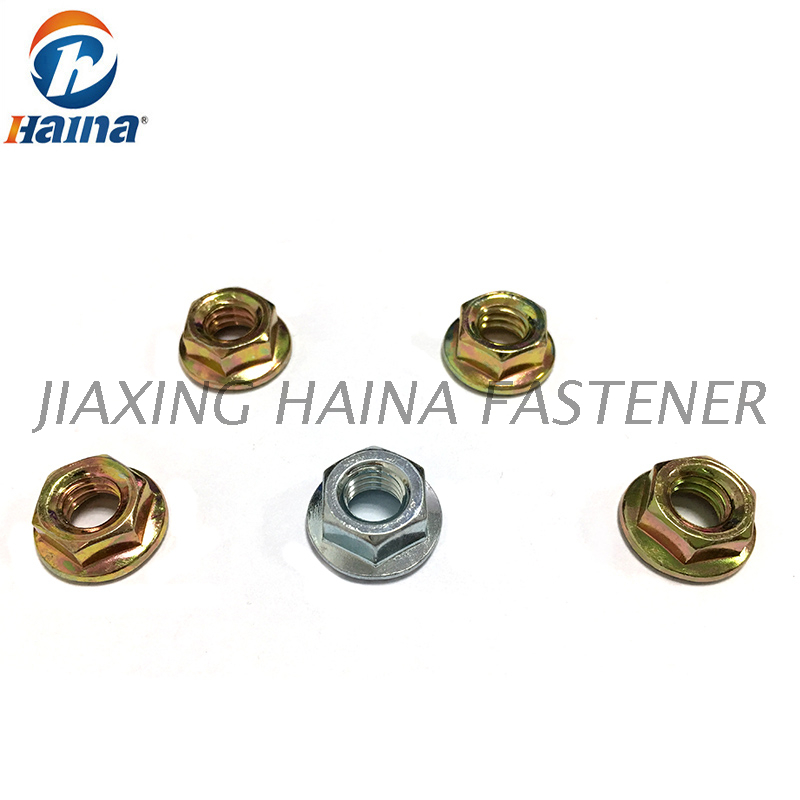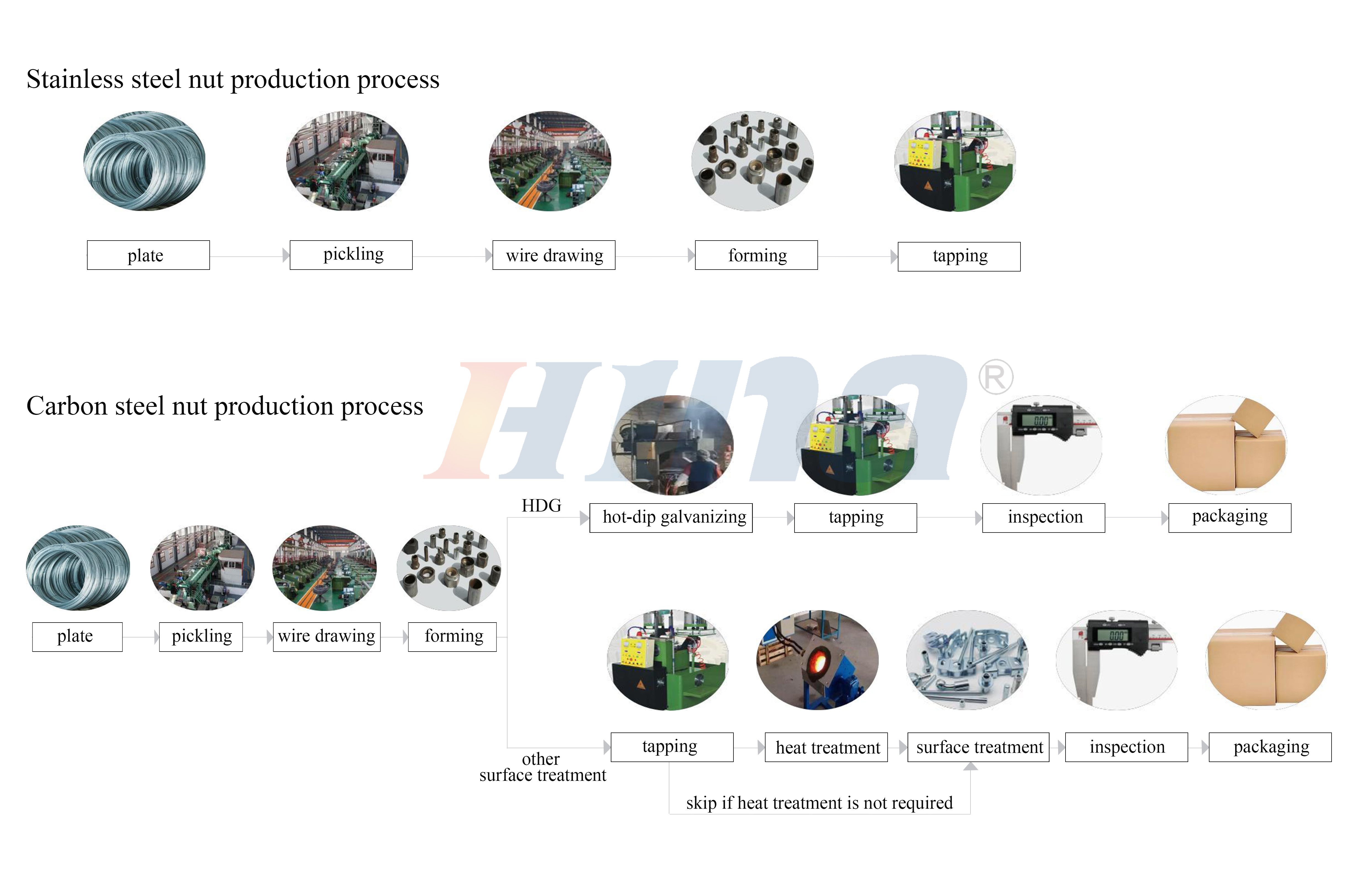- All
- Product Name
- Product Keyword
- Product Model
- Product Summary
- Product Description
- Multi Field Search
| Availability: | |
|---|---|
| Quantity: | |






DIN6923
HNF
HINA2025012001
Definition:
A yellow zinc flange nut is a type of nut featuring a flange design, typically made from steel or other alloys, and coated with a yellow zinc layer for corrosion resistance. The flange part helps increase the contact area, distribute the load, and enhance stability. It is widely used in mechanical and construction industries.

Flange Design:
The flange is located at the bottom of the nut and is usually circular, providing a larger contact area. This helps distribute pressure and prevents excessive compression or deformation of the nut.
Yellow Zinc Plating:
The yellow zinc coating gives the nut a golden or yellow appearance and provides excellent corrosion resistance, preventing rust or oxidation, making it ideal for use in humid or corrosive environments.
High Durability:
The zinc coating has high hardness, offering good friction resistance and wear resistance, which extends the service life of the nut.
Strong Tightening Force:
The flange nut design provides greater stability during tightening, making it less likely to loosen and offering better resistance to vibration.
Excellent Corrosion Resistance:
The yellow zinc plating effectively protects the nut from corrosion caused by moisture, salt spray, and other external factors, enhancing its durability.
Anti-loosening Performance:
The flange design provides a larger contact area, preventing the nut from loosening due to vibrations or changes in pressure, ensuring a stable connection.
Increased Load-bearing Capacity:
The flange structure helps distribute the load, reducing the risk of localized pressure concentration, which improves the load-bearing capacity of the connected components.
Strong Adaptability:
Suitable for various complex and harsh environments, especially in applications subjected to vibration or dynamic loads.

Mechanical Manufacturing:
Yellow zinc flange nuts are used in the fastening of various mechanical equipment and machine components, ensuring stable connections and proper operation.
Construction Industry:
Used in structural connections, bracket fixing, and other applications, especially in construction projects subjected to high vibration or pressure.
Automotive Industry:
Widely used in automotive chassis, engine components, and other parts that require durability and corrosion resistance.
Aerospace and Military:
Due to their excellent vibration resistance and corrosion resistance, they are also commonly used in aerospace and military equipment.
Piping Connections:
Flange nuts are used in water pipes, gas pipes, and other piping systems to provide secure connections and prevent loosening due to pressure or vibration.
Yellow zinc flange nuts combine excellent corrosion resistance with reliable fastening performance, making them an essential fastening component in various industrial fields.
Our service
Professional Manufacturer : All of our Fastener are designed and manufactured according to buyers'specification and performance.
Quality is guaranteed : Durability testing and critical technical design to enhance fasteners lifetime.
Cost effective : Wide range of parts selection , Competitive prices with professional factory supply.
Customized ideal Fasteners : customized services according to the samples and drawing offered.
Certification
Through scientific management, Jiaxing Haina fastener Ltd company has been obtained ISO9000 certificate of Quality Managerment System, SGS and BV international certificate system of Make in China.

What materials are used to make hex nuts and flange nuts?
Both hex nuts and flange nuts are typically made from materials like steel, stainless steel, brass, or nylon, depending on the application and required strength or corrosion resistance.
What is the difference between a nut and a bolt?
A bolt is a threaded fastener with an external thread, while a nut has internal threads that fit onto the bolt. A bolt and nut are used together to fasten two or more parts.
Definition:
A yellow zinc flange nut is a type of nut featuring a flange design, typically made from steel or other alloys, and coated with a yellow zinc layer for corrosion resistance. The flange part helps increase the contact area, distribute the load, and enhance stability. It is widely used in mechanical and construction industries.

Flange Design:
The flange is located at the bottom of the nut and is usually circular, providing a larger contact area. This helps distribute pressure and prevents excessive compression or deformation of the nut.
Yellow Zinc Plating:
The yellow zinc coating gives the nut a golden or yellow appearance and provides excellent corrosion resistance, preventing rust or oxidation, making it ideal for use in humid or corrosive environments.
High Durability:
The zinc coating has high hardness, offering good friction resistance and wear resistance, which extends the service life of the nut.
Strong Tightening Force:
The flange nut design provides greater stability during tightening, making it less likely to loosen and offering better resistance to vibration.
Excellent Corrosion Resistance:
The yellow zinc plating effectively protects the nut from corrosion caused by moisture, salt spray, and other external factors, enhancing its durability.
Anti-loosening Performance:
The flange design provides a larger contact area, preventing the nut from loosening due to vibrations or changes in pressure, ensuring a stable connection.
Increased Load-bearing Capacity:
The flange structure helps distribute the load, reducing the risk of localized pressure concentration, which improves the load-bearing capacity of the connected components.
Strong Adaptability:
Suitable for various complex and harsh environments, especially in applications subjected to vibration or dynamic loads.

Mechanical Manufacturing:
Yellow zinc flange nuts are used in the fastening of various mechanical equipment and machine components, ensuring stable connections and proper operation.
Construction Industry:
Used in structural connections, bracket fixing, and other applications, especially in construction projects subjected to high vibration or pressure.
Automotive Industry:
Widely used in automotive chassis, engine components, and other parts that require durability and corrosion resistance.
Aerospace and Military:
Due to their excellent vibration resistance and corrosion resistance, they are also commonly used in aerospace and military equipment.
Piping Connections:
Flange nuts are used in water pipes, gas pipes, and other piping systems to provide secure connections and prevent loosening due to pressure or vibration.
Yellow zinc flange nuts combine excellent corrosion resistance with reliable fastening performance, making them an essential fastening component in various industrial fields.
Our service
Professional Manufacturer : All of our Fastener are designed and manufactured according to buyers'specification and performance.
Quality is guaranteed : Durability testing and critical technical design to enhance fasteners lifetime.
Cost effective : Wide range of parts selection , Competitive prices with professional factory supply.
Customized ideal Fasteners : customized services according to the samples and drawing offered.
Certification
Through scientific management, Jiaxing Haina fastener Ltd company has been obtained ISO9000 certificate of Quality Managerment System, SGS and BV international certificate system of Make in China.

What materials are used to make hex nuts and flange nuts?
Both hex nuts and flange nuts are typically made from materials like steel, stainless steel, brass, or nylon, depending on the application and required strength or corrosion resistance.
What is the difference between a nut and a bolt?
A bolt is a threaded fastener with an external thread, while a nut has internal threads that fit onto the bolt. A bolt and nut are used together to fasten two or more parts.